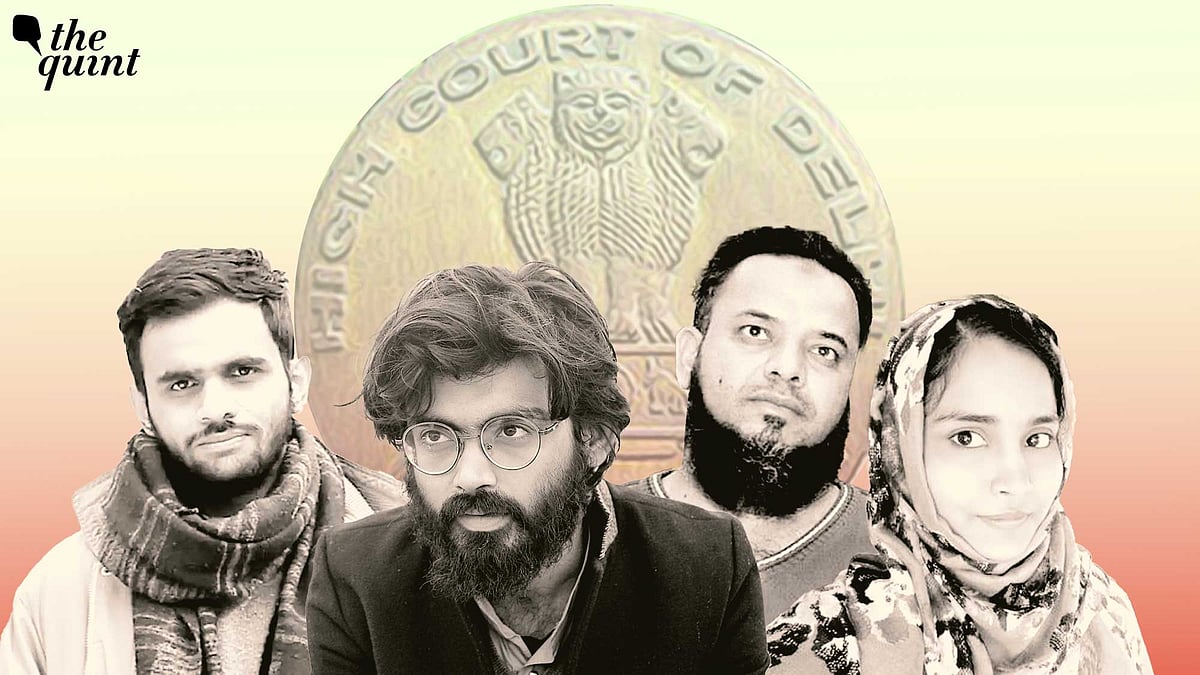
'Trial Moving at Natural Pace': HC On Denying Bail to Umar, Sharjeel & Others
"All appeals are dismissed," pronounced the Bench of Judges Shalinder Kaur and Navin Chawla.

advertisement
The Delhi High Court has denied bail to Umar Khalid, Sharjeel Imam, Khalid Saifi, Gulfisha Fatima and others in Delhi riots larger conspiracy case on Tuesday, 2 September.
This particularly case refers to the FIR 59 wherein UAPA charges have been applied and it has been linked to an alleged conspiracy behind the February 2020 riots.
Meanwhile, a separate bench comprising Justice Subramonium Prasad and Justice Harish Vaidyanathan Shankar denied bail to co-accused Tasleem Ahmed. “The appeal is dismissed,” the bench said.
This, even though, the judges had previously asked the Delhi police as to how long can an accused be kept in jail as it has been more than five years since the Delhi pogrom of 2020.
The bail petitions before Kaur's bench also include petitions by co-accused Athar Khan, Salim Khan, Shifa Ur Rehman, Meeran Haider and Shadab Ahmed who have been languishing in jail for over five years without a trial.
Their bail pleas have been heard by different benches from time to time and had Judge Kaur not pronounced the order, the arguments would have been heard the fourth time all over again as she is set to retire by end of this week.
Umar Khalid, Sharjeel Imam and several others have been booked under Unlawful Activities (Prevention) Act (UAPA) and provisions of the Indian Penal Code for allegedly being the "masterminds" of the February 2020 riots, which had left 53 people dead and over 700 injured. The violence had erupted during the protests against the CAA and NRC.
'Trial Progressing At a Natural Pace'
The Quint also accessed the court order. In the final analysis outlined in the detailed order, the Bench observed that it is not necessary that all the accused persons must be involved in all facets of the criminality.
"Participation in one group or the other, and the connectivity of the Appellant with the co-accused persons, including Shadab Ahmad, Umar Khalid etc, are factors to be considered. The WhatsApp groups that the Appellant allegedly created, of which one noticeably, revolve around coordination in protests and ensuring that as many women participate in the protests. This factum of creation of these two groups cannot be seen in isolation..." the court noted.
These political prisoners, whether it's Umar, Gulfisha, Saifi or Haider, have all been incarcerated for over five years without any trial.
The court also made an observation, referring to US President Donald Trump's visit.
"It is alleged that the Appellant (Gulfisha) played her role in the execution of the conspiracy, being one of the persons responsible for managing the protest sites in Seelampur and to have attended alleged conspiratorial meetings on 23/24.01.2020 and 16/17.02.2020, wherein co-accused Umar Khalid allegedly instructed them to escalate the protests into riots by resorting to violence and by using chilli powder, sticks, stones, etc., and to coordinate chakka-jams during the visit of the President of the USA."
- Access to all paywalled content on site
- Ad-free experience across The Quint
- Early previews of our Special Projects
Published: 02 Sep 2025,03:06 PM IST